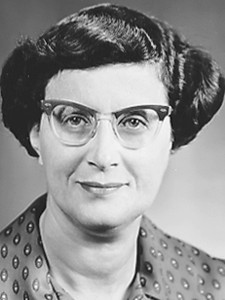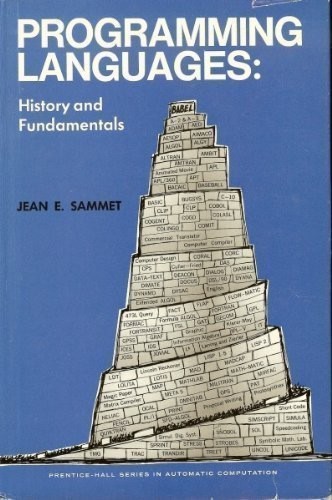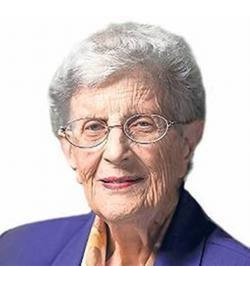| Jean Sammet, Programming Pioneer |
| Written by Sue Gee | |||
| Wednesday, 31 May 2017 | |||
|
Jean E. Sammet, the American computer scientist who developed the FORMAC programming language and was the first woman to serve as President of ACM, passed away May 21 at the age of 89. Jean E Sammet (March 23, 1928 - May 21, 2017) Jean Sammet was born in New York in 1928. From the outset she had a strong interest in mathematics and to gain her undergraduate degree chose Mount Holyoke College, a liberal arts college, for the reputation of its mathematics program. She majored in mathematics and also took education courses to be certified to teach high school math in New York. She pursued post graduate studies at the University of Illinois where she received her MA in 1949. From 1953 to 1958 Jean Sammet was a mathematician for Sperry Gyroscope in New York and it was here that she began her career as a programmer. In her acceptance speech for the IEEE Computer Society 2009 Computer Pioneer Award (in the above video), Jean Sammet recalled how she first got involved with computing, in 1955. At the time she was doing mathematical work for the Department of the Navy's submarine program subs and torpedoes. One day her boss asked if she was aware that a couple of the company's engineers were building a digital computer. Jean said yes, even though she didn't quite know what it meant. The conversation continued: Boss: "Would you like to be our programmer?" Jean: "What's a programmer?" She added: At that time there wasn't anybody to consult - no books - no papers . There was ACM, but didn't know about it.
There's another anecdote in the video about a young male colleague called John who was assigned to work with her. After some training Jean sent John off with some instructions to work out a problem, telling him to contact her if he needed help. After 30 to 40 minutes she had not heard anything she became worried and went to see what had transpired. She found John poring over a printout with a big grin of his face and their conversation went: Jean: "Did your program work?" John: "No" Jean: "Why are you sitting there looking so happy?" John: "Do you mean they are really paying me to have all this fun!" She concludes this tale with: "That to me has always been the very best description of programming that I have encountered." To spread her enthusiasm for programming she taught one of the very earliest graduate courses in programming at the Applied Mathematics department of Adelphi College on Long Island from 1956 to 1958, despite the fact that the institution didn't have a computer and few textbooks existed. From 1958 to 1961, she worked at Sylvania Electric Products where she managed the basic software development for MOBIDIC, a computer built for the Army Signal Corps. From 1959 to 1961, she served as a key member of the committee, headed by Grace Hopper, that developed COBOL, which became the standard programming language for business applications around the world. Years later in response to the question: "Why do you think that academicians have chosen to ignore COBOL?" Jean answered: "Many have a snobbish attitude and feel it is beneath their dignity". Sammet authored Programming Languages: History and Fundamentals , which was called an instant computer classic when published in 1969. Jean Sammet joined IBM in 1961 to manage the Boston Programming Center. Here she initiated the concept, and directed the development of FORMAC, FORmula MAnipulation Compiler, a general language and system for manipulating nonnumeric algebra based on FORTRAN that supported computation, manipulation, and use of symbolic expressions. In 1965, she became programming language technology manager in the IBM systems development division and later led IBM's work on the Ada programming language and only retired from IBM in late 1988. Her book "Programming Languages: History and Fundamentals" was called an instant computer classic when published in 1969.
In the following video snippet from Mount Hoylake, which awarded Jean Sammet an honorary doctorate in 1978, sheis asked about her working in a field that was heavily male-dominated and whether she experienced discrimination.
By way of answer she shared an anecdote about a newly appointed boss who calls his first staff meeting of a team of five people, Jean and four male colleagues and makes as his opening remark, "Gentlemen. let's get started", the pauses and frowns and begins again "Gentlemen and lady, let's get started ... No I don't like that. Jean from now on you're a man, you're a gentleman". Asked what she felt about this, Jean said: "That was fine, it was funny, it didn't bother me." Jean Sammet became a world authority on the history of programming languages and had a long association with the ACM. She was named chair of ACM SICSAM (later SIGSAM) in 1967, chair of SIGPLAN in 1971, vice president from 1972 to 1974 during which time she was asked to to serve as chairman of the first ACM Long Range Planning Committee (LRPC). In 1974, she was elected the first female president of the ACM. She received the ACM Distinguished Service Award in 1985: "for dedicated, tireless, and dynamic leadership in service to ACM and the computing community; for advancing the art and science of computer programming languages and recording its history." The IEEE Computer Society, whose Computer Pioneer Award honors individuals whose contributions to the development of the computer field occur at least 15 years earlier, presented it in 2009 to Jean Sammet : "for pioneering work and lifetime achievement as one of the first developers and researchers in programming languages." Among other honors, she was made a member of the U.S. National Academy of Engineering in 1977; was awarded the Augusta Ada Lovelace Award from the Association for Women in Computing in 1989, was named a Computer History Museum Fellow in 2001 and received the Pioneer Award of the National Center for Women & Information Technology (NCWIT) in 2013.
More InformationACM NEWS In Memoriam: Jean E. Sammet 1928-2017 Jean E Sammet 2009 Computer Pioneer Award Recipient Related ArticlesComputer Languages by Committee - the 1960s
To be informed about new articles on I Programmer, sign up for our weekly newsletter, subscribe to the RSS feed and follow us on Facebook or Linkedin.
Comments
or email your comment to: comments@i-programmer.info <ASIN: 0137299885> |
|||
| Last Updated ( Wednesday, 31 May 2017 ) |




